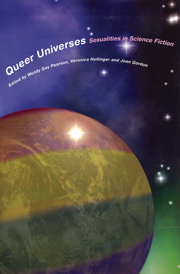Book contents
- Frontmatter
- Contents
- Acknowledgements
- Notes on Contributors
- Introduction: Queer Universes
- Part I Queering the Scene
- Part II Un/Doing History
- Part III Disordering Desires
- ‘Something Like a Fiction’: Speculative Intersections of Sexuality and Technology
- ‘And How Many Souls Do You Have?’: Technologies of Perverse Desire and Queer Sex in Science Fiction Erotica
- BDSMSF(QF): Sadomasochistic Readings of Québécois Women's Science Fiction
- Part IV Embodying New Worlds
- Works Cited
- Index
‘And How Many Souls Do You Have?’: Technologies of Perverse Desire and Queer Sex in Science Fiction Erotica
from Part III - Disordering Desires
- Frontmatter
- Contents
- Acknowledgements
- Notes on Contributors
- Introduction: Queer Universes
- Part I Queering the Scene
- Part II Un/Doing History
- Part III Disordering Desires
- ‘Something Like a Fiction’: Speculative Intersections of Sexuality and Technology
- ‘And How Many Souls Do You Have?’: Technologies of Perverse Desire and Queer Sex in Science Fiction Erotica
- BDSMSF(QF): Sadomasochistic Readings of Québécois Women's Science Fiction
- Part IV Embodying New Worlds
- Works Cited
- Index
Summary
I'm not asking that you change what you find sexually attractive; only that you experimentally discard the requirement for compatible fantasy when reading about sex. Remember, it's just a book. And if you do occasionally find yourself responding – well, that's educational, too.
— Ray Davis, ‘Delany's Dirt’ 165Visiting a world where the most intriguing gender of all is ‘I'm not telling’… Boys, girls, both, neither, licking, kissing, liking, loving. It doesn't matter whether you, reader, are boy, girl, straight, all or none of the above, I think you'll get along just fine.
— Cecilia Tan, Genderflex 8Perverse Sexualities as Queer Transgressions
Working on the fantastic in the arts means occasional trips to strange (imaginary) places. The science fiction erotica published by Cecilia Tan, and the ‘pleasure’ of researching queer science fiction pornography, took my experience to a new level. Tucked away on back shelves of independent science fiction bookstores and alternative erotica shops, these books are intended to be consumed in bed or while stretched out on the living room couch during an afternoon alone at home. They evoke a flushed reading satisfaction and a slight sense of guilt because they decadently provide nothing but pleasure. Reading them for ‘research’ earns the dedicated academic raised eyebrows from colleagues and produces slightly awkward moments at the photocopier. Literary critics do not usually regard pleasure as an analytical variable.
- Type
- Chapter
- Information
- Queer UniversesSexualities in Science Fiction, pp. 161 - 179Publisher: Liverpool University PressPrint publication year: 2010
- 3
- Cited by



